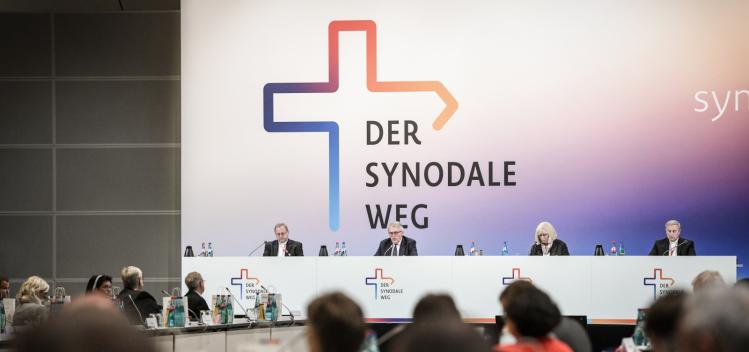
Germany’s Synodale Weg (“synodal way”), led by the German conference of bishops and the national committee of lay German Catholics (ZdK), assembled for the third time in February; it was likely a watershed moment in the German Church’s synodal process. Some 230 delegates, lay and clergy, debated and voted on over a dozen documents produced by working groups in four areas: power in the Church; the model of priesthood; women and ministries; and sexual morality in Church teaching. Each of the documents won the approval of well over two-thirds of all delegates (ranging from 74 percent to 92 percent), and just over two-thirds of the bishops. In addition to voting, some bishops even made bold interventions in favor of doctrinal change. (If they had talked like that when they were still priests, they would never have become bishops in the first place.) A separate set of texts receiving a second reading was also approved; they call for more transparency in the use of power in the Church and for a lay decision-making body to compile lists of potential bishop candidates to send the Vatican, together with the college of canons of the cathedral, a German tradition largely undercut by the Vatican in the last decades.
The first group of approved documents call for a doctrinal rethinking about homosexuality and for blessings of all couples in the Church, including divorced and remarried Catholics and same-sex couples. They advocate for a development of the idea of “conjugal love” in the Catechism and a revision of the teaching on contraception; for the admission of married priests into the Roman Catholic Church by the pope or by a future council following in the footsteps of Vatican II; and for a reflection on the access of men and women to ordained ministries (the diaconate and the priesthood). There are also calls for the pope to allow Catholic priests to marry while remaining in office—a proposal approved by 86 percent of the delegates.
If approved at the end of Germany’s national synod this fall, the proposals will be submitted as contributions to the global synodal process launched by Pope Francis in October 2021 and culminating in the Bishops’ Synod in Rome in October 2023. They will not be automatically adopted by the Church in Germany, but it’s hard to imagine a future for Catholicism in Germany without at least some of the changes recommended by the Synodale Weg being implemented.
“I expect the bishops to implement what Pope Francis initiated at the beginning of his pontificate: to find decentralized solutions and thus to open up paths for a powerful future for the church in Germany,” said Synodale Weg president Irme Stetter-Karp. “To expect that the universal church will solve problems that one has to take care of oneself locally—that is not our expectation as committee of German Catholics. We have to act here on our own. Nobody can take that away from us. Not even the pope can.”
The structure of Germany’s “synodal path” says a lot about the uniqueness of German Catholicism, including the fact that its president is a woman. Stetter-Karp is also a social scientist with vast leadership experience in Catholic charities and the president of the national committee of lay Catholics. The two vice presidents are Osnabrück Bishop Franz-Josef Bode and the respected New Testament scholar Thomas Söding. How Synodale Weg came to be is also illustrative. It emerged out of the increasingly diverging trajectories between the progressive Catholic Church in Germany (bishops, theologians, and laypeople alike) and the Vatican, especially under John Paul II.
The explosion of the sex-abuse scandal during the pontificate of Benedict XVI was also a factor in its development. Defiant public advocacy for changes in Church teaching on homosexuality—including the blessings of same-sex couples in May 2021 and the coming-out of over a hundred gay clergy and Catholic employees in January—are obviously expressive of the extent of this shift. Revelations about then-Archbishop Ratzinger’s handling of abuse cases in Munich between 1977 and 1982, and his February letter of apology, were met with anger. But many progressive German Catholics are also growing critical of Francis’s pontificate, especially over the decision to leave bishops who mishandled abuse cases (in Cologne, Hamburg, and Munich) in office. Once there were leaders like Cardinal Karl Lehmann (1936–2018), who could keep the German Church and Rome together. But bishops with that kind of charisma are harder to find now.
The departure of Angela Merkel has also complicated things. From the beginning of her tenure as chancellor she was attentive to the public role of religion. In 2010, after revelations about clerical sex abuse, she intervened to prevent escalation of tensions between Church and state. The new government, led by Social Democrat Olaf Scholz, who left the Lutheran Church years ago, in a coalition with the secularist Liberal Party (FDP) and the Greens, has left the Catholic Church in Germany in a different position compared to the previous seventeen years. The abuse crisis continues to provide fodder for those seeking a disestablishment and a separation of Church and state in Germany, which would have cataclysmic consequences, including financial and economic ones.
U.S. Catholicism diverges from Rome in its own ways, but it is nothing like the Catholic Church in Germany, which is unified and endowed with such institutional legitimacy. It’s not that the proposals taken up are that special, given how they reflect the sensibilities of many Catholics today, in Germany and elsewhere. But the German synod sets a special path for the ways in which such proposals are debated and approved. Its work was underway before Francis launched the 2021–2023 synodal process, and it is developing in a democratic way that is distinct from the Roman understanding of synodality. The German synod is expressing, and with more popular legitimacy and theological clarity, what many Catholics have thought for quite some time and now have started to say in public, including leaders like Cardinal Jean-Claude Hollerich, president of the European bishops’ conferences (COMECE), who was appointed by Francis in July 2021 as “general relator” for the 2023 synod.
The distance between Rome and Germany is as clear now under Francis as it has been in regard to John Paul II and Benedict XVI, and Synodale Weg is a direct challenge to the current pope’s emphasis of the “synodal process.” First, its method is more parliament-like than the discerning approach that Francis prefers. Second, in its emphasis on revising doctrine on issues like ordained ministry, it departs from Francis’s emphasis on the spiritual aspect of the synodal moment, in a pastoral togetherness of the people of God. Additionally, the German synod expresses a Catholic culture that relies on academic theology and on institutional systems of representation of the laity; it is rooted in Vatican II but without the qualms about the compatibility between modernity and Christian faith. It represents a progressive theology in Germany (contrary to liberal Catholicism in the United States, for example) that doesn’t rely on Francis’s leftist positions on social and economic justice. It is a theological culture with which Jorge Mario Bergoglio interacted briefly in 1986, when he decided to abandon his project for a doctoral dissertation.
But, at some point, the German path and Roman way will have to interact. The hope is that these differing approaches to reform will somehow come together rather than collide.

